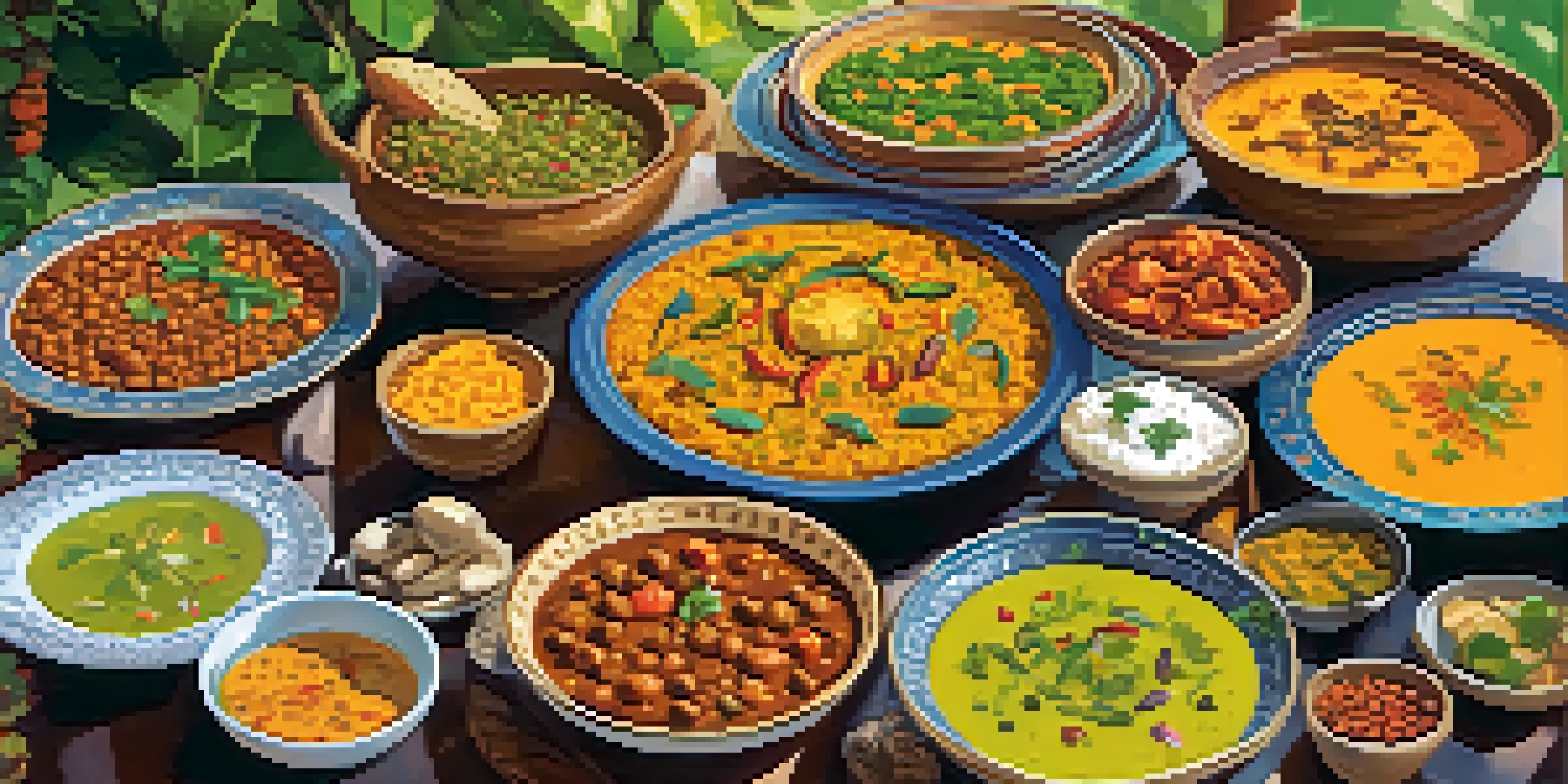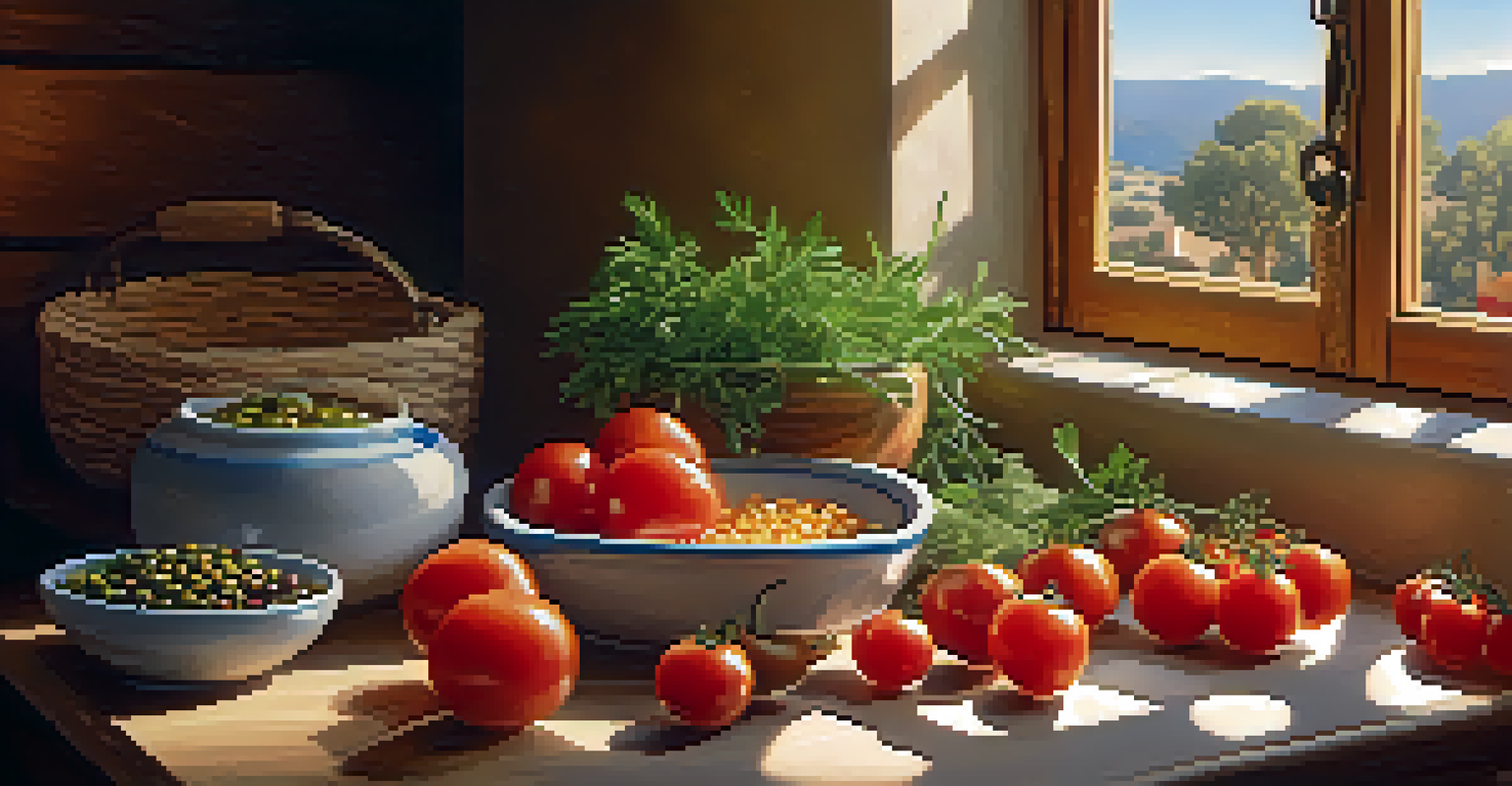The Impact of Culture on Vegetarian Food Cravings

Cultural Background and Food Choices
Culture plays a significant role in shaping our food preferences, often dictating what we find appealing or unappealing. For instance, individuals from different cultural backgrounds may have varying perceptions of vegetables and grains, influencing their willingness to adopt a vegetarian lifestyle. This cultural lens not only affects the ingredients we choose but also the cooking methods and flavors we crave.
Food is a central activity of mankind and one of the single most significant trademarks of a culture.
Take, for example, Indian cuisine, where a rich tapestry of spices makes vegetarian dishes vibrant and deeply satisfying. Contrast this with some Western cultures where meat-heavy meals dominate, often leading to a perception that vegetarian options are less fulfilling. Understanding these cultural contexts can help us appreciate the diverse ways vegetarianism is experienced around the world.
Ultimately, our upbringing and cultural heritage shape not just our food choices, but also our cravings, leading to a wide array of vegetarian dishes that reflect our personal tastes and cultural identities.
Tradition and Its Role in Food Cravings
Traditions surrounding food can heavily influence our cravings for vegetarian dishes. Many cultures have established rituals and festivals that celebrate plant-based foods, reinforcing their importance in communal and family settings. For instance, during Lent, many Christians abstain from meat, leading to a surge in demand for creative vegetarian recipes.

These traditions not only create a sense of belonging but also elevate the status of vegetarian options during specific times of the year. Consider how during Diwali, a Hindu festival, sweets and savory vegetarian snacks are integral, showcasing the rich flavors and textures of plant-based ingredients. This tradition can spark cravings that linger well beyond the festivities.
Culture Shapes Food Choices
Cultural backgrounds significantly influence our food preferences, including our openness to vegetarianism.
Therefore, the traditions we engage with can evoke powerful cravings for vegetarian food, making these dishes more than just meals; they become a part of our identity and cultural expression.
Regional Ingredients and Food Cravings
The availability of local ingredients greatly influences vegetarian food cravings across different regions. In areas where fresh vegetables, legumes, and grains are abundant, it's common to see an increased interest in plant-based diets. For example, Mediterranean regions often focus on olives, tomatoes, and herbs, which not only define their cuisine but also shape cravings for these fresh, wholesome ingredients.
You are what you eat, so don’t be fast, cheap, easy, or fake.
On the other hand, regions with less agricultural diversity may rely on processed vegetarian options, which can affect the authenticity and appeal of the dishes. This disparity can lead to cravings that are not as vibrant or satisfying, as fresh ingredients often heighten the sensory experience of food. The use of local, seasonal produce can lead to a more profound appreciation and craving for vegetarian meals.
In essence, the ingredients available in a region not only dictate what can be prepared but also play a crucial role in shaping the cravings that develop around vegetarian food.
Social Influences on Vegetarian Food Preferences
Social circles and peer influences can significantly impact our cravings for vegetarian food. Friends and family who embrace a vegetarian lifestyle can inspire others to explore similar options, often leading to shared meals and experiences that highlight the joy of plant-based foods. This social aspect can make vegetarian dishes more appealing as they become tied to positive interactions and memories.
For example, consider a group of friends who regularly gather to cook and share vegetarian meals. Their enthusiasm and creativity can lead to cravings that extend beyond the gatherings, as individuals begin to seek out these flavors and experiences in their own cooking. This social reinforcement can cultivate a deeper appreciation for vegetarian cuisine.
Traditions Fuel Vegetarian Cravings
Food traditions and rituals establish a sense of belonging and can evoke strong cravings for vegetarian dishes.
Thus, the social dynamics surrounding food not only shape what we eat but also influence our cravings, making vegetarian dishes more enticing through shared experiences.
Media Representation of Vegetarian Food
Media plays a crucial role in shaping our perceptions and cravings for vegetarian food. Cookbooks, social media, and cooking shows often highlight vibrant vegetarian dishes, showcasing their appeal and versatility. The way vegetarian meals are presented can evoke strong cravings, as visually appealing images can trigger our appetite and curiosity.
Consider platforms like Instagram, where colorful, beautifully plated vegetarian meals can go viral, inspiring viewers to try making similar dishes at home. This exposure can lead to a surge in cravings for specific vegetarian foods, as people are motivated to recreate those experiences in their kitchens. The power of visual media can be a driving force behind food trends, including the rise of plant-based eating.
Ultimately, the representation of vegetarian food in media can elevate its status and desirability, influencing our cravings and encouraging a more widespread appreciation for plant-based meals.
Health Consciousness and Vegetarian Cravings
As health consciousness rises, many individuals develop cravings for vegetarian foods perceived as healthier. With increasing awareness of the benefits of plant-based diets, people are often drawn to vegetables, fruits, nuts, and whole grains for their nutritional value. This shift in mindset can lead to a stronger desire for vegetarian options, especially among those looking to improve their overall health.
For instance, the popularity of vegan and vegetarian meal plans often stems from their association with weight management and disease prevention. As more people become aware of the health benefits, cravings for wholesome, plant-based meals can grow, leading to a more significant incorporation of these foods into daily diets. This health-driven shift can create a cycle where positive health outcomes further reinforce these cravings.
Health Awareness Drives Plant-Based Eating
Growing health consciousness encourages cravings for vegetarian foods perceived as healthier and more nutritious.
In this way, the interplay between health awareness and food cravings highlights how cultural shifts can influence our dietary choices, steering more individuals towards vegetarianism.
Personal Experiences and Cravings for Vegetarian Food
Personal experiences, such as travel or exposure to different cuisines, can deeply influence our cravings for vegetarian food. Experiencing a variety of flavors and cooking styles broadens our palate, often leading to a newfound appreciation for plant-based dishes. For example, a trip to Thailand may introduce someone to the vibrant and aromatic world of Thai vegetarian cuisine, sparking cravings that last long after the trip.
These encounters can encourage individuals to experiment with new ingredients and recipes, fostering a desire for vegetarian meals that resonate with their travel experiences. As we seek to recreate those flavors at home, our cravings become a bridge connecting us to those memorable moments.

Ultimately, personal experiences shape not only our tastes but also our cravings, highlighting the rich diversity of vegetarian food that exists around the globe.